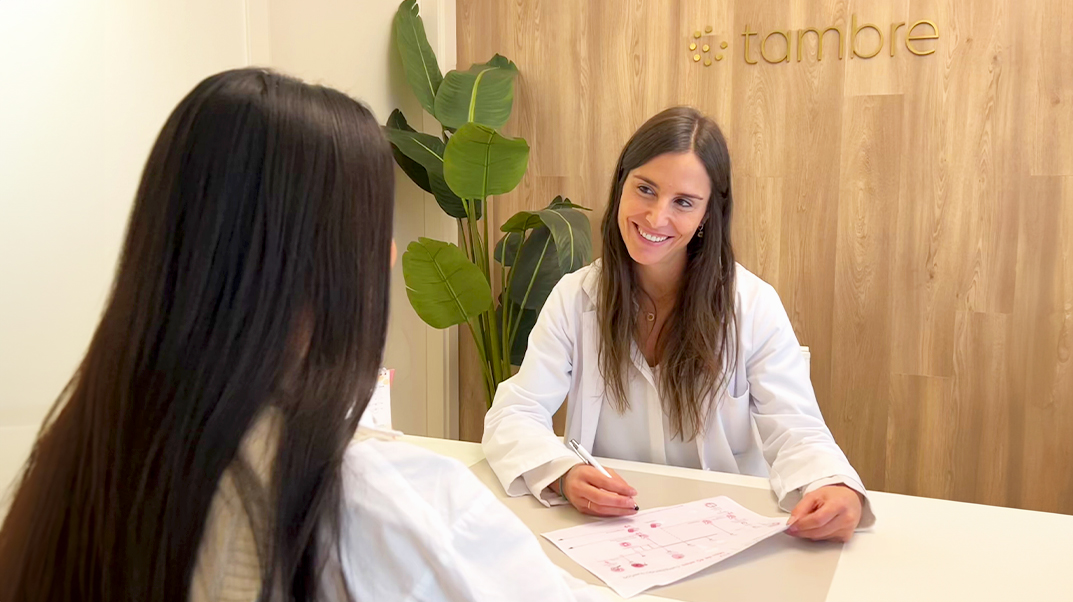Table of contents
The function of the thyroid gland is essential to the reproductive system, especially in women. Therefore, if you have been diagnosed with a thyroid disorder, you may have noticed changes in your menstrual cycle and this may be affecting your ability to get pregnant.
If you are interested in understanding how thyroid disorders affect the menstrual cycle and in which cases it may be necessary to consider assisted reproductive treatments, you are welcome to read on.
The importance of the thyroid in the menstrual cycle
Located in the neck, the thyroid gland is responsible for secreting hormones that regulate metabolism and directly affect vital organs, including the reproductive organs. The two most common disorders associated with the thyroid are hypothyroidism, when the gland does not produce enough thyroid hormones, and hyperthyroidism, when excessive thyroid hormones are produced.
As a result, the hormonal balance necessary for a regular menstrual cycle can be disturbed in both cases. In the case of hypothyroidism, the decrease in thyroid hormones can cause irregular menstrual cycles, alterations in ovulation and even anovulation. In hyperthyroidism there may also be menstrual irregularities or even the absence of menstruation (amenorrhoea).
The link between thyroid disorders and the menstrual cycle is thus evident. Women with hypothyroidism may experience impaired ovulation, as there may be an increase in prolactin, the breastfeeding hormone that inhibits ovulation, thereby decreasing the chances of pregnancy. In addition, untreated hypothyroidism during pregnancy can increase the risk of complications such as miscarriage, premature birth and problems with foetal development.
Fertility may also be reduced in the case of hyperthyroidism. In addition, there is a risk of complications during pregnancy, such as hypertension, pre-eclampsia and problems with foetal growth.

Woman doctor conducting ultrasound of thyroid gland and lymph nodes closeup.
Treatments that improve the menstrual cycle and fertility
Early diagnosis and appropriate treatment are crucial to minimise the effects of thyroid disorders on reproductive health. The specialist who will perform and evaluate thyroid function tests is the endocrinologist, who will identify any imbalances and recommend the most appropriate treatment to regulate thyroid function. In women intending to conceive, the dosage of medication must be adjusted under medical supervision in order to optimise fertility conditions.
In the case of hyperthyroidism, anti-thyroid medications are commonly administered to reduce the amount of hormones and alleviate symptoms. In some cases, radioactive iodine may be necessary to destroy parts of the thyroid gland, or surgery may be required to remove it.
The treatment of hypothyroidism involves the oral administration of synthetic thyroid hormones. This type of drug is administered in increasing doses until the metabolism is stabilised and the thyroid functions correctly.
Getting pregnant suffering from thyroid problems, should I use assisted reproduction?
Once the thyroid problem has been diagnosed and treated, the menstrual cycle is usually reinstated, which can lead to a natural pregnancy. In addition, treatment will also reduce the risk of miscarriage during the first trimester of pregnancy and thyroid-related problems in the foetus.
However, if your endocrinologist has prescribed treatment and your thyroid hormone levels are stabilised, and yet after a year (or six months if you are over 35) you are still unable to conceive, it may be appropriate to consider seeking help from assisted reproduction specialists.

Clinica Tambre’s fertility specialist, Dr. Paloma Sánchez-Gómez.
Remember that, in order to overcome ovulation problems, we at Tambre provide controlled and personalised ovarian stimulation. This enables us to control both follicular growth and the time of ovulation, without altering or causing changes in the endocrine gland.
In the case of hypothyroidism, women must follow the treatment prescribed by their endocrinologist, even if undergoing IVF. Treatment with thyroid hormone supplements does not affect the quality of the eggs. Moreover, in the event of pregnancy, the woman should continue with this treatment during pregnancy and breastfeeding to maintain adequate hormone levels.
The approach is different for women with hyperthyroidism, as they may be treated with iodine to control the disease, which can affect the quality of the eggs and a 4-6 month wait before seeking pregnancy would be recommended.
There is an undeniable connection between thyroid disorders, the menstrual cycle and fertility. This is why we place so much emphasis on improving general health parameters before any procedure is performed. In fact, during the first consultation at Tambre, we perform fundamental female fertility tests which include analysis of the thyroid hormone level TSH and thyroid antibodies.
If you are experiencing problems with your thyroid gland that are affecting your menstrual cycle and fertility, do not hesitate to contact Tambre and make your first appointment now on +44 (0) 20 38 688 650. We will design a personalised treatment tailored to your needs and thyroid hormone levels to achieve the pregnancy you want without compromising your health or the health of your future baby.


